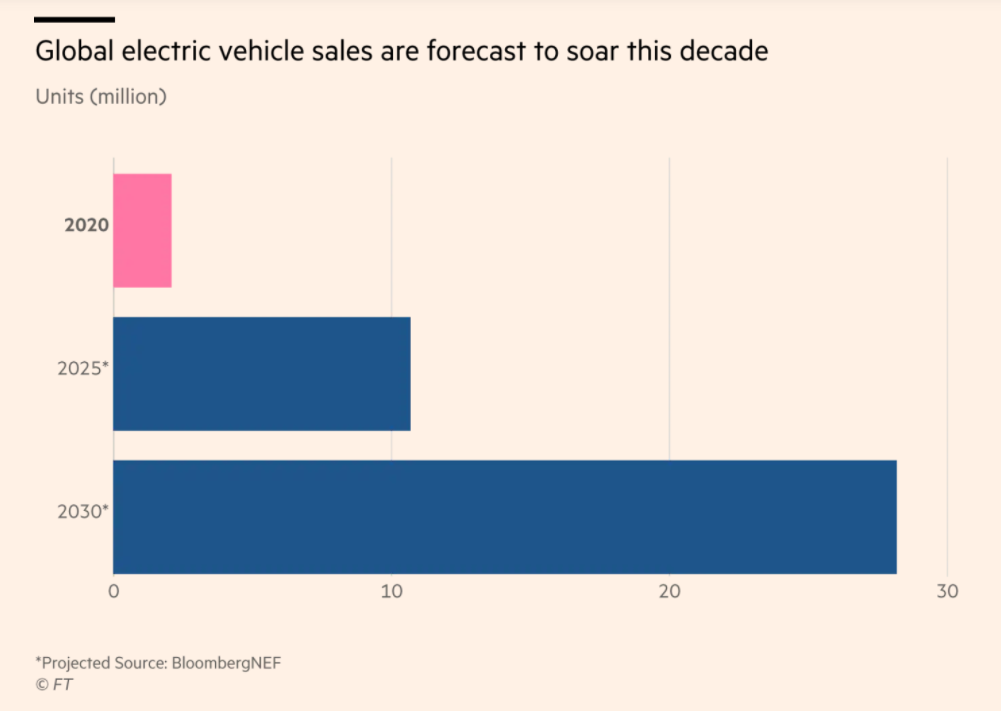From the financial impact of the Facebook outage to the electric vehicle revolution to green jobs, read this week’s trends from the world of work.
October 8, 2021
Future of Work
Future of Skills
In the world of work this week… For hours on Monday, three of the world’s most popular social media platforms went dark – and businesses that relied heavily on Facebook or Instagram saw their revenue dip in a big way. More highlights you may have missed this week:
-
In the lead up the mental health day, a call to action from our CHRO
-
The Greek postal service has new helpers: tiny robots
-
Everything the modern day CHRO needs to know from our FU.SE 2021sessions
-
Why solar power might be the new industrial revolution
We’ve got a full breakdown of all the top headlines you can’t miss this week.
#1. The impact of the Facebook outage.
On Monday, users around the world kept refreshing their Facebook, Instagram, and Whatsapp accounts, only to find that the service was down. For more than five hours on Monday, three of the most popular social media platforms in the world went dark.
The outage had a huge impact on advertisers, many of which rely heavily on both Instagram and Facebook. One freelance media buyer, which spoke to the New York Times, said that those platforms alone soak up around $80 million to $100 million in ad spending he manages each year. When the outage hit Facebook, one company watched their revenge plunge 70%. Another company saw their sales slip 30 percent. The Facebook outage served as a stark reminder to many businesses which are still beholden to Facebook’s powerful influence on their ability to do business.
That lack of competition is the reason that Facebook needs more rivals, EU antitrust chief Margrethe Vestager said. "We need alternatives and choices in the tech market, and must not rely on a few big players, whoever they are, that's the aim of (the) DMA," she tweeted. Vestager proposed the Digital Markets Act last year, a proposal that sets out a list of dos and don’t for big tech players like Amazon, Facebook, and Google – forcing them to change their business model to allow for more competition, according to a Reuters report.
The outage had a huge impact on advertisers, many of which rely heavily on both Instagram and Facebook. One freelance media buyer, which spoke to the New York Times, said that those platforms alone soak up around $80 million to $100 million in ad spending he manages each year. When the outage hit Facebook, one company watched their revenge plunge 70%. Another company saw their sales slip 30 percent. The Facebook outage served as a stark reminder to many businesses which are still beholden to Facebook’s powerful influence on their ability to do business.
That lack of competition is the reason that Facebook needs more rivals, EU antitrust chief Margrethe Vestager said. "We need alternatives and choices in the tech market, and must not rely on a few big players, whoever they are, that's the aim of (the) DMA," she tweeted. Vestager proposed the Digital Markets Act last year, a proposal that sets out a list of dos and don’t for big tech players like Amazon, Facebook, and Google – forcing them to change their business model to allow for more competition, according to a Reuters report.

#2. AI posed to transform the construction industry.
The construction industry is starting to change the way it works, thanks to advancements in artificial intelligence. The pandemic has made it clear to stakeholders in the industry: it’s time to adopt digital solutions to age-old problems.
“The construction industry has historically been comprised of fragmented project teams which used complex work processes that were executed in siloed systems,” said Karthik Venkatasubramanian, who is the Global Vice President of Data Strategy and Development at Oracle Construction and Engineering. “Given the hands-on nature of construction work, the industry has traditionally relied on human experience and expertise to complete projects, and the potential benefits of adopting technologies were often overshadowed.”
The pandemic has only been a catalyst in the industry, though. When you factor in infrastructure investments from governments, chronic labour shortages, supply-chain disruption, and the need for sustainable solutions, change was on the horizon. Read more at Forbes.
“The construction industry has historically been comprised of fragmented project teams which used complex work processes that were executed in siloed systems,” said Karthik Venkatasubramanian, who is the Global Vice President of Data Strategy and Development at Oracle Construction and Engineering. “Given the hands-on nature of construction work, the industry has traditionally relied on human experience and expertise to complete projects, and the potential benefits of adopting technologies were often overshadowed.”
The pandemic has only been a catalyst in the industry, though. When you factor in infrastructure investments from governments, chronic labour shortages, supply-chain disruption, and the need for sustainable solutions, change was on the horizon. Read more at Forbes.

#3. The electric vehicle revolution is finally here.
From Shanghai to Stuttgart, Tokyo to Toronto, the demand for electric vehicles is exploding. Global sales of electric vehicles are expected to top 10 million by 2025 and 28 million by 2030.
Some countries have already begun adopting electric vehicles, the Financial Times reports. In Europe, one in 12 cars sold between April and June this year were electric. If you were to include hybrid cars in that count, the number rises to one in three cars sold. The demand has increased from 198,000 cars sold in 2018 to an expected 1.17 million this year. And that number will only grow.
Electric vehicles still only comprise around 1 percent of the global passenger car fleet, but sales have taken off. Within four years, a quarter of new cars purchased in China and nearly 40% purchased in Germany will be electric, according to BloombergNEF.
The shift will shake up the automotive industry as well. Companies are chasing the new workforce that comes along with the fast-paced change in demands. It’s becoming increasingly clear that building internal resilience and ensuring business continuity requires a deeper, more meaningful and holistic assessment of companies’ talent strategies. It’s a strategy that top automotive leaders agreed would require a dramatic shift during our automotive industry webinar.
Some countries have already begun adopting electric vehicles, the Financial Times reports. In Europe, one in 12 cars sold between April and June this year were electric. If you were to include hybrid cars in that count, the number rises to one in three cars sold. The demand has increased from 198,000 cars sold in 2018 to an expected 1.17 million this year. And that number will only grow.
Electric vehicles still only comprise around 1 percent of the global passenger car fleet, but sales have taken off. Within four years, a quarter of new cars purchased in China and nearly 40% purchased in Germany will be electric, according to BloombergNEF.
The shift will shake up the automotive industry as well. Companies are chasing the new workforce that comes along with the fast-paced change in demands. It’s becoming increasingly clear that building internal resilience and ensuring business continuity requires a deeper, more meaningful and holistic assessment of companies’ talent strategies. It’s a strategy that top automotive leaders agreed would require a dramatic shift during our automotive industry webinar.

#4. Most ethnic minority finance workers suffer discrimination, UK report finds
In the U.K., two in three finance workers from black and minority ethnic backgrounds have reported facing discrimination in the workplace, according to a Guardian report. An industry survey found that the financial industry was failing to back up diversity pledges with concrete action. According to reboot.’s Race to Equality report, 66% of BAME staff said they had experienced discrimination. More than a quarter said that discrimination was holding back their career, while nearly half said their career progression was slower than it was for white colleagues.
Jörg Ambrosius, the European chief executive of the US investment manager State Street, said: “There is more work for all of us, and the problems and challenges that remain will only be solved if we address them collectively. This must have everyone’s attention.” Read the full report at The Guardian.
Jörg Ambrosius, the European chief executive of the US investment manager State Street, said: “There is more work for all of us, and the problems and challenges that remain will only be solved if we address them collectively. This must have everyone’s attention.” Read the full report at The Guardian.

#5. One often overlooked factor that could curb enthusiasm for the office.
Prior to the pandemic, workers in many countries spent a good amount of their morning and afternoons commuting. Most businesses wouldn’t consider the 45 minutes spent commuting in the morning as “company time.” However, commuting was viewed as a necessary cost of employment.
But when Covid-19 hit, that all changed for most office workers. Workers who would spend an hour commuting could now spend time working out, pursuing a hobby, playing with their kids, or even just getting more work done. For the past 18 months, that additional time has been bookmarked for something else for thousands of employees. With most workers hesitant to return to the office, how will managers handle the extra time workers are used to having? Read more at the Business Journals.
But when Covid-19 hit, that all changed for most office workers. Workers who would spend an hour commuting could now spend time working out, pursuing a hobby, playing with their kids, or even just getting more work done. For the past 18 months, that additional time has been bookmarked for something else for thousands of employees. With most workers hesitant to return to the office, how will managers handle the extra time workers are used to having? Read more at the Business Journals.




